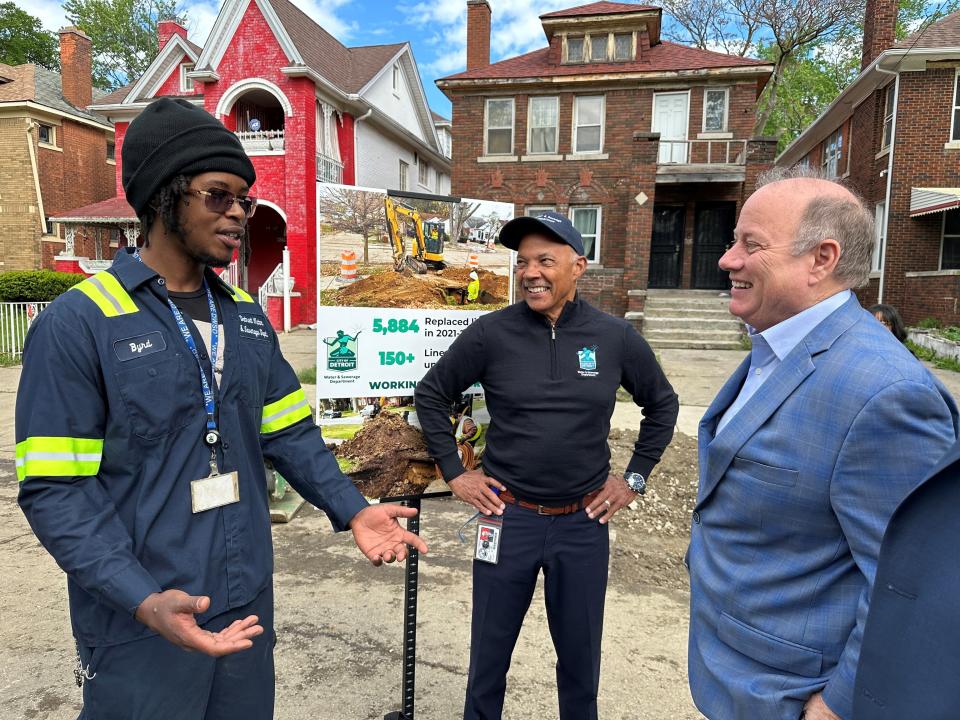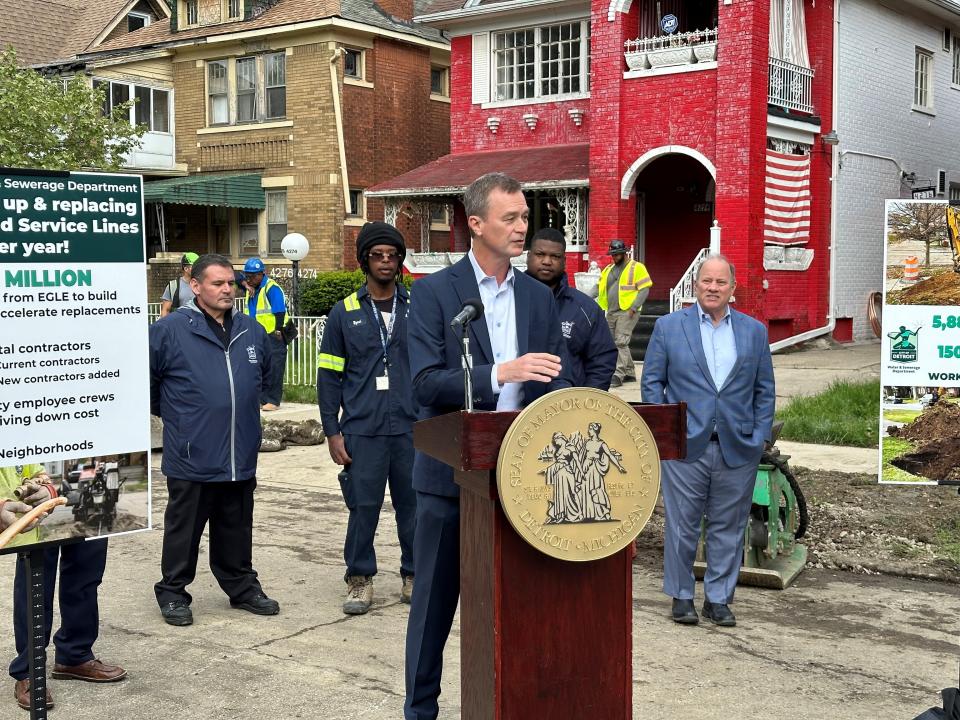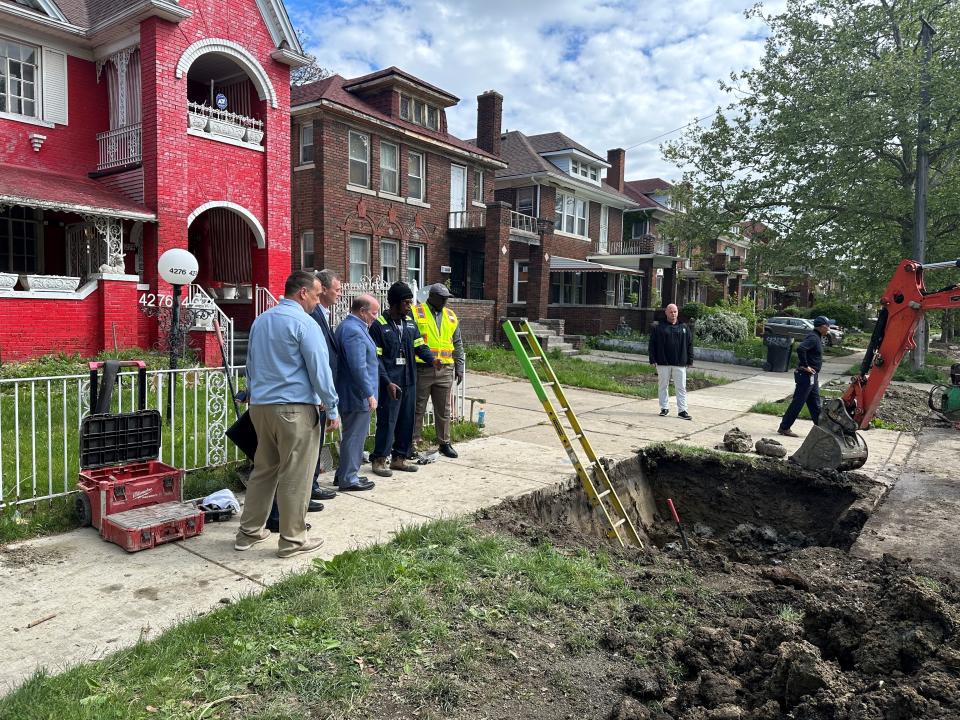Detroit receives $85M to replace 8,000 lead service lines annually
- Oops!Something went wrong.Please try again later.
Detroit officials are dubbing the city as a national leader in replacing lead service lines as crews accelerate the pace to 8,000 replacements per year.
Mayor Mike Duggan said that while attending the U.S. Conference of Mayors in January, Environmental Protection Agency officials touted Detroit Water and Sewerage Department Director Gary Brown's handling of lead line replacements.
Each week, contractors are replacing more than 150 lines, which deliver water into homes, with the expectation to replace all 80,000 lines in Detroit within the next 10 years. Last year, Detroit was replacing 5,000 annually with a goal of hitting 10,000 by this year. The city would not be able to complete it without state and federal grants, Duggan and Brown said in a Friday announcement in Russell Woods.
"In Detroit, we've got the best water quality drinking water in America," Duggan said Friday. "We haven't had issues. We test it and it is great. I think everybody here knows the story of the tragedy in Flint that occurred when they switched off of Detroit water.
Project will cost $800 million over 10 years
"But here's the truth, these lead lines were put in 80, 90 and in some cases, 100 years ago. Over time, they will deteriorate. Detroit is different than a lot of other cities in America. We didn't wait till we had a health problem. We are getting ahead of it and we are replacing those lead lines before we have any sign of it."
Water leaving Detroit water treatment plants does not contain lead, but lead can be released from lead service lines as water moves through, according to the city. Detroit stopped allowing the installation of lead piping in 1945, but homes built before that are likely to contain them. Replacing a line costs roughly $9,300, Brown said, adding that it's his duty to reel in funding to cover the costs.

"We've been able to drive costs down because we're hiring Detroiters at DWSD to also do the work and set the market price," Brown said. "Our locals are getting union wages, they're getting health care and they're getting benefits and they're still able to compete at a lower rate than contractors."
Detroit-based contractors include LGC and Major Contracting. Others include Plymouth-based Bidigare Contractors, and Wisconsin-based Five Start Energy Services.
Over the next 10 years, the project will cost $800 million, Brown said. Property owners will not be responsible for covering expenses, however, they are responsible for the service line from the stopbox to the inside of the house, according to the city. Crews are identifying homes needing the replacements through BlueConduit, a predictive software company recommended through the EPA working with the University of Michigan to identify lines, Brown added. DWSD is also identifying lines through demolitions involving water needing to be cut and determining whether the house had lead or copper.
"We were able to put all of that data into a database that tells us the likelihood of density within a neighborhood. Most importantly, we're going into neighborhoods that are disadvantaged, low-income. We're going into neighborhoods that have a lot of kids. We can look at the census and know what areas of the city there are kids," Brown said.
Michigan's Department of Environment, Great Lakes and Energy is funding work with a $75 million grant using American Rescue Plan Act money, $10 million from the Drinking Water State Revolving Fund, along with $5 million from the Environmental Protection Agency WIIN initiative. EGLE Director Phil Roos touted the state's MI Clean Water Plan, which invested $4 billion to improve drinking water, stormwater and wastewater facilities across Michigan.

"About $1 billion of that money has gone specifically to lead service lines like what is happening here in Detroit, and we have the strongest lead and copper rule for protecting our citizens from lead contamination in the country and we continue to have that," Roos said. "That's exciting, that this is the city that is really a national leader in replacing lead service lines, and that's a big deal and something a lot of other cities around the country are going to learn from."
'Good, fresh, clean water. That's really what I do every day'
Detroit's drinking water is below the lead action level at 9 parts per billion, according to the city.
Lead is a neurotoxin that can damage the brain and kidneys and can affect the way the body makes red blood cells. There is no safe level of lead in drinking water, but the state's Lead and Copper Rule requires communities to take action when more than 10% of water samples test higher than 15 parts per billion. That standard drops to 12 ppb by January 2025.
Gov. Gretchen Whitmer recently announced another $290 million increase in the MI Clean Water Plan.
"It's often said that Michigan is a state literally defined by its waters, and that's really true. We have 21% of the world's fresh surface water. That water is the primary drinking source for 40 million people in the U.S. and Canada, and certainly here in the city of Detroit," Roos said.
Skills for Life alum Darius Byrd is one of 12 employees who replaces lead service lines. He took classes in masonry and restoration before being hired by DWSD. Swapping lines can take eight to 12 hours a day, depending on whether trees or roots are nearby, Byrd said.

"Every day we do about two houses with lead service line replacement. We dig to the main, replace the old lead and replace it with new copper so we can get a city good water. Good, fresh, clean water. That's really what I do every day," Byrd said.
More information is available online, including a list of upcoming neighborhoods.
Dana Afana is the Detroit city hall reporter for the Free Press. Contact: dafana@freepress.com. Follow her: @DanaAfana
This article originally appeared on Detroit Free Press: Detroit gets $85 million to replace thousands of lead service lines

